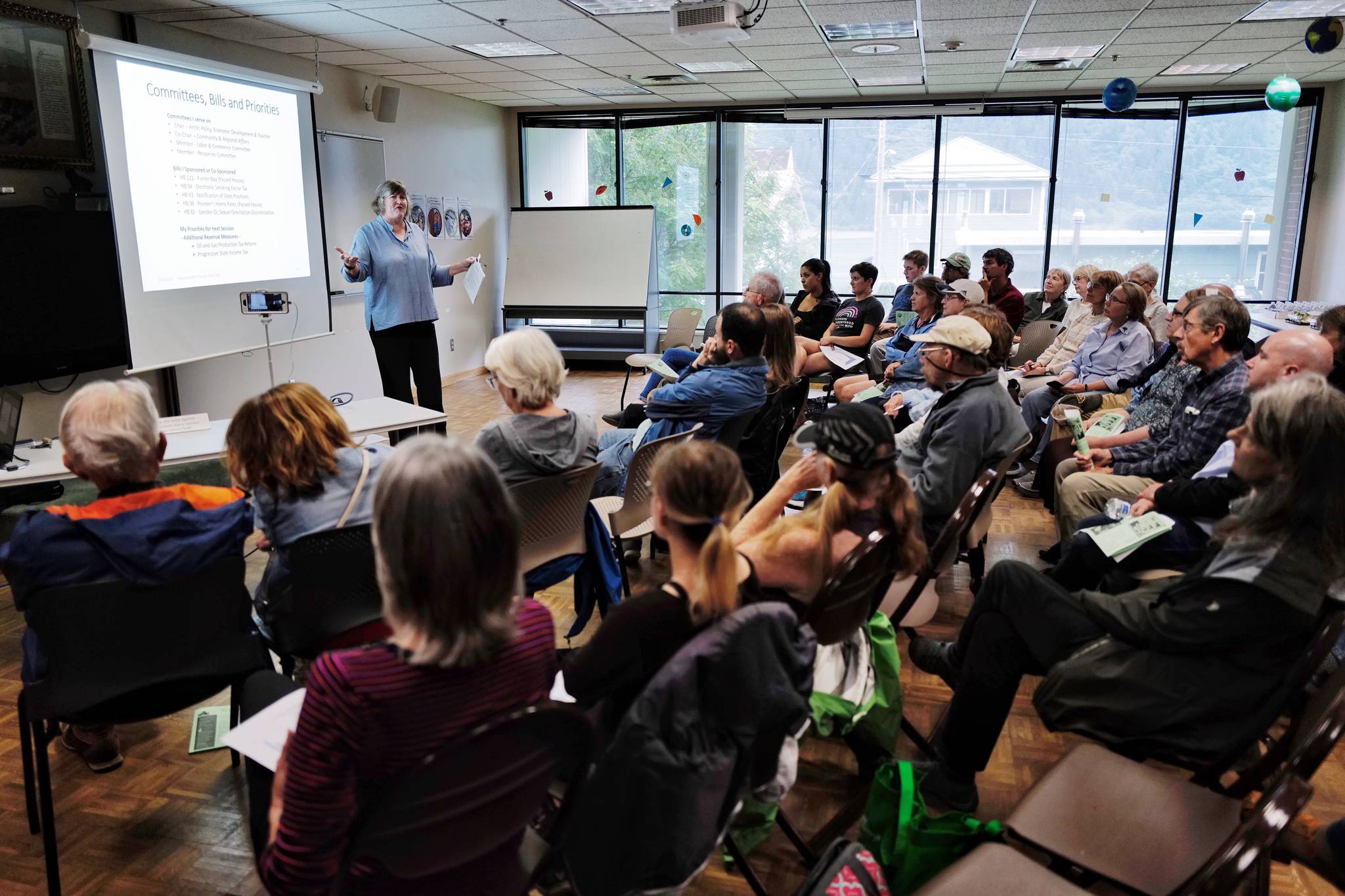Rep. Sara Hannan, D-Juneau, met with constituents at the Douglas Public Library Monday evening to discuss what happens now that Gov. Mike Dunleavy’s cut to the state budget have been allowed to stand.
The representative’s message was both big and small picture, talking about what’s going to happen the next couple of days, and larger changes to the state that could be enacted to potentially avoid such contentious political fights in the future.
“We don’t have a fiscal problem,” Hannan told the roughly 30 people gathered at the library, “we have a revenue problem.”
Hannan said that the state’s funds have been too tied to oil for too long, and that when the price of oil fell several years ago, the state’s revenue fell too.
It was time, she said, that the state start looking at other sources of revenue. She said that she had proposed a tax on nicotine vaping products, but that had failed to make it out of committee.
“You don’t know how many lobbyists there are,” Hannan said, “until you introduce a bill to tax vaping.” She said that cannabis vaping products are taxed along with all other marijuana products, but not so with nicotine products like Juul electronic cigarettes. She told the crowd that Juul had sent a representative from San Francisco to urge her to reconsider.
She said that there hadn’t been any serious talk about new taxes in the legislature for several years, but in light of recent budget shortfalls, people were starting to come around.
“I think there’s a critical mass of people in this state that are willing to talk about oil and gas tax reform,” she said.
In addition to reconsidering the tax credits given to oil companies, there were a number of small taxes that could be enacted, which taken together, could produce significant income and make a dent in the state’s budget deficit.
“We don’t have a lot of state taxes unless you’re industry,” she said. She also said she was in favor of a progressive income tax. “I think it taps into our migratory, seasonal workers. Many of those people make their living in Alaska but they’re not paying Alaska,” she said.
One member of the audience asked if there was a way that the University of Alaska could be made more efficient in order to bring costs down.
“(The) Board of Regents is set up to make those decisions,” Hannan said. “I don’t want to micromanage the regents but I think the administration has made it clear that cuts need to be made.”
She referenced the Board of Regents meeting that took place earlier Monday, but was not aware of what transpired there.
The talk turned to House Bill 2001, currently in the House Finance Committee and under deliberation all week. The bill could potentially restore some of the funding cut by Dunleavy’s vetoes, but that bill too, is subject to veto.
The difference with HB 2001 is that it is the bill needed to appropriate funds for the Permanent Fund Dividend, a priority for both Dunleavy and his supporters in the legislature.
Asked whether it would have just been better to have gone to Wasilla, and tried to negotiate with the whole legislature there, Hannan replied that the law which said the governor had the power to set a location for a special session had never been used. Had the majority of the legislature gone to Wasilla it would’ve set a precedent that would make it more difficult to challenge the governor’s power on the matter more difficult.
“The day you go to Wasilla is the day your capital moves,” Hannan said she had heard other legislators say.
Hannan urged constituents not to lose hope, and stressed that options were still available. She expressed optimism that HB 2001 could be passed, but refused to speculate how many legislators would be in Juneau in the coming weeks.
• Contact reporter Peter Segall at 523-2228 or at psegall@juneauempire.com

